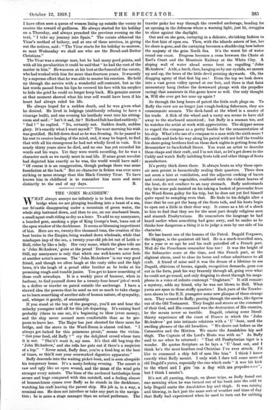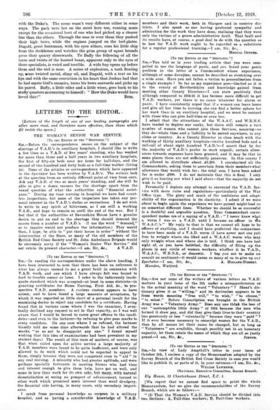THE 'JOHN McANDREW.'
WHAT always annoys me infinitely is to look down from the bridge when we are plunging headlong into a beast of a sea, our fo'castle disappearing under a mountain of green water, the whole ship battened down, and then to see, on our starboard beam, a small squat craft riding as dry as a bone. To add to my annoyance, a bearded gent, smoking a pipe of King George's best, leans out of the open window of the deckhouse. It seems so blooming impertinent of him. Here are we, twenty-five thousand tons, the creation of the best brains in the Empire, being washed down wholesale, while that misshapen imp of the sea, a twenty-year-old job-lot out of Leith or Hull, rides by like a lady. Her very name, which the glass tells me is 'John McAndrew,' grins at the proud ` Devastator ' on our stern. Still, my annoyance is only that which one well-known actor feels at another actor's success. The 'John McAndrew' is our very good friend, and though we often laugh at the rusty sides and the high bows, it's the laugh of a proud elder brother as he looks at his promising rough-and-tumble junior. You get to know something of these craft nowadays. It is a weekly piece of humour, when in harbour, to find yourself down for a twenty-four-hours' job-o'-work in a drifter or trawler on patrol outside the anchorage. I have a shrewd idea the powers-that-be send us not so much to take charge as to learn something of another side of human nature, of sympathy, and, whisper it gently, of seamanship.
If you stand at the top of the gangway, you'll see and hear the unlucky youngster told off for this job departing. It's raining hard probably (three to one on), it's beginning to blow (even money), and the ship never seemed more comfortable than as he pre- pares to leave her. The Major has just shouted for three more for bridge, and the stove in the Ward-Room is almost red-hot. "I always get lurked for this poisonous picnic," moans the victim. "Got your food, old Baffy 7 " cry the delighted crowd whose turn it is not. " Sha'n't want it, my sons. It's that old bug-trap the 'John McAndrew,' and she rolls her guts out if there's a suspicion of a lop." "Never mind, Baffy dear, you're a food-hog at the best of times, so this'll rest your overworked digestive apparatus."
Baffy descends into the waiting picket-boat, and is soon alongside his temporary home. It's a nasty-looking evening. The sunset is raw and ugly like an open wound, and the moan of the wind gets stronger every minute. The lines of the anchored battleships loom secure and huge compared with this nutshell, and a feeling almost of homesickness comes over Baffy as he stands in the deckhouse, watching his craft leaving the parent ship. His job is, in a way, a nominal one. He does not interfere or take any part in the naviga- tion ; he is more a stage manager than an actual performer. The
trawler picks her way through the crowded anchorage, heading for an opening in the defences where a warning light, just lit, struggles to shine against the daylight.
Out and on she goes, curtsying in a delicate, shrinking fashion to the first hint of open sea. Then, with the islands astern of her, her lee shore is gone, and the curtsying becomes a shuddering bow before the majesty of the grim North Sea. It's the worst bit of water round our coast. Progress becomes a cross between the Chute at Earl's Court and the Mountain Railway at the White City. A sloping wall of water ahead seems bent on engulfing 'John McAndrew.' A tilt, a lurch, then, hanging on by our eyelids, we mount up and up, the bows of the little devil pointing skywards. Oh, the dragging agony of that first big sea ! From the top we look down into a vast green valley spread at our feet, and there is that faint momentary hang (before the downward plunge with the propeller racing) that amateurs in this game know so well. Our only thought is, Will she ever get her nose up again ?
So through the long hours of patrol the little craft plugs on. To Baffy the crew are no longer just rough-looking fishermen, they are consummate seamen. The deck-hand at the wheel is a master of his trade. A flick of the wheel and a nasty sea seems to have slid away to the starboard unnoticed ; but Baffy is a seaman too, and he watches the artist at work with appreciation. The skipper seems to regard the compass as a pretty bauble for the ornamentation of his ship. What's the use of a compass to a man with the sixth sense ? He smells and feels his way along his patrol with not half the trouble his shore-going brothers find on these dark nights in getting from the Broomielaw to Sauchiehall Street. You want an artist to describe these chaps and their craft, and I'm not that, so let's get down to the Cuddy and watch Baffy imbibing Scots talk and other things of Scots manufacture.
It's pretty thick down there. It always beats us why these open- air men persist in hermetically sealing their quarters. There does not seem a hint at ventilation, and the adjacent cooking of bacon and certain* potent vegetables, combined with the violent heaves of the boat, do not conduce to an easy stomach. Baffy understands why his wiser pals insisted on his taking a basket of provender from the Ward-Room galley for his trip, but he does not yet feel himself quite equal to sampling even that. He finds to his delight after a time that he can get the hang of the Scots talk, and his hosts begin to open out a little in their dour way. It comes as a bit of a shock to him to find that they are for the most part deeply religious men and staunch Presbyterians. He remembers the language he had heard earlier when something had gone awry, and he smiles as he thinks how dangerous a thing it is to judge a man by one side of his character.
He has learnt one of the lessons of the PatroL Dugald Ferguson. the Skipper, is the quaintest old bird. He is a much-travelled man, for a year or so ago he and his craft patrolled off a French port. Well do the Frenchmen remember him too ! It was the height of the Submarine scare at the time, and this French port, at the slightest alarm, used to close its boom and refuse admittance to all craft. A friend of mine said it was the dream of a lifetime to see Dugald, oblivious of booms, signals, recognition demands, guns run out in the forts, push his way brazenly through all, going over what he could not go round, and only deigning to shout through his mega- phone in a voice of infinite contempt " Ongletare." It still remaini a mystery, adds my friend, why he was not blown to Hell. What yarns are spun in those stuffy quarters ! Each yarn of the Trawler- men shows to the R.N. youngster some new glimpse of these strange men. They seemed to Baffy, peering through the smoke, like figures out of the Old Testament. They fought and strove at the command of their God, and His command was the destruction of His enemies,
be the means never so terrible. Dugald, relating some blood- thirsty experience off the coast of France in which the 'John McAndrew' got into intimate relations with a U '-boat, used the swelling phrases of the old Israelites. "We drove out before us the Canaanites and the Hittites. We smote the Amalekites hip and thigh. The Captain of the Lord's Hosts was with us." As Baffy said to me when he returned : "That old Presbyterian tiger is a wonder. He quotes Scripture as he lays a 'U '-boat out, and I think he's the most heathen real Christian I've ever struck. I'd like to command a ship full of men like him." I think I know exactly what Baffy meant. I only wish I dare tell some more of old Dugald's yarns, especially the one which ends "A wee bit kick to the wheel and I giee 'em a flap with ma propeller-r-r-r"; but I think I mustn't.
It's not all yarning, though, on these trips, as Daffy found out one morning when he was turned out of his bunk into the cold to help Dugald smite the Amalekites hip and thigh. It was raining and blowing, in fact just the same sort of weather and time of day that Baffy had experienced when he used to turn out for (subbing
with the Duke's. The scene wasn't very different either in some ways. The pack were hot on the scent here too, running mute except for the occasional hoot of one who had picked up a clearer line than the others. Through the seas or over them they pushed their high bows, while the engines jumped on the bed-plates. Dugald, great huntsman, with his eyes ablaze, cons his little ship from the deckhouse and watches the grim group of squat hounds press their quarry shorewards. To Baffy the following of all the turns and twists of the hunted beast, apparent only to the eyes of those specialists, is weird and terrible. A wide bay opens up before them and the end is near. A series of explosions, a tank floating up, some twisted metal, slimy oil, and Dugald, with a text on his lips and with the same conviction in his heart that Joshua had that he had smote God's enemies, turns his bows seawards and picks up his patrol. Baffy, a little older and a little wiser, goes back to his stuffy quarters murmuring to himself : " How the Duke would have



































 Previous page
Previous page